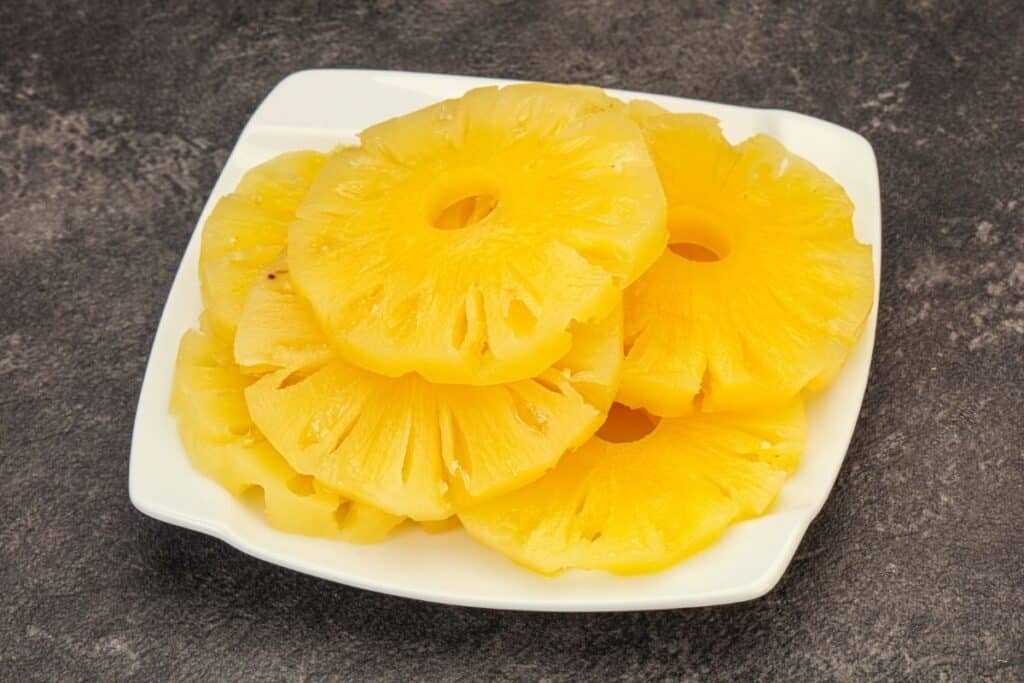Pineapple is one of the best foods you can eat to heal your gut, thanks to a potent anti-inflammatory enzyme that it contains called bromelain.
Plus, it has a delicious tropical flavor and satisfies your sweet tooth better than most fruits. But, like most fruits, pineapple is high in carbs and is best avoided if you’re a strict keto dieter.
In this guide, we’ll discuss how many carbs are in pineapple and whether or not it has a place in your keto or low-carb diet.
Pineapple Nutrition Facts
A 100-gram serving of raw, fresh pineapple contains the following (*):
- 50 calories
- 0.12 grams of fat
- 13.12 grams of carbs (11.72 grams net carbs)
- 1.4 grams of fiber
- 0.54 grams of protein
Raw pineapple also contains a wide variety of micronutrients, such as calcium, iron, magnesium, phosphorus, potassium, zinc, copper, vitamins A and C, and folate.
How Many Carbs In Pineapple?
Most grocery stores sell whole pineapple and these can be hard to cut, but you can also get it pre-cut and sliced in smaller portions. It is also found in fresh fruit blends and in canned form.
Fresh, raw pineapple contains approximately 13.12 grams of carbs and 11.72 grams of net carbs per 100-gram serving.
If your goal is to stay in ketosis, then this works out to be about a little more than half of your daily allowance for carbohydrates.
Remember you need about 20 to 25 grams of carbs or less than 5 percent of your total daily total intake to stay in fat-burning mode.
Is Pineapple Keto-Friendly?
If you’re on a strict keto diet and need to eat keto-approved foods only, then – no, pineapple is not a keto-friendly fruit to eat.
This is because a small serving of pineapple contains about half of your daily allowance for carbs. You don’t have to eat much for you to be kicked out of ketosis.
Despite being high in antioxidants, it’s lower in fiber than other fruits – such as berries – and higher in sugar, meaning that the net carb content and impact on your blood sugar is greater.
Pineapple has a glycemic index (GI) of about 55, making it a moderately high glycemic food.
Glycemic index refers to how quickly the glucose in a food will reach your bloodstream and raise your insulin level. If you are concerned about your blood sugar levels, then you may need to limit your intake of foods with a high GI.
However, pineapple has a low glycemic load of about 6 because it’s high in water (approximately 86 percent water, to be exact).
Keeping your portions around the 100-gram serving is a good way to control pineapple’s impact on your blood sugar.
If you are NOT on a strict keto diet and your goal is to eat low-carb only, then pineapple can fit into your diet in moderation.
You can always crunch your macros for the day and fit a small amount of pineapple in if you’re looking to keep your carbs under a certain number.
For example, try adding a slice of grilled pineapple to a grass-fed burger and top it with bacon and avocado for a unique twist on a staple low-carb dish.
You can also eat a few chunks of raw pineapple with a handful of nuts. The fat in the nuts will help you absorb the antioxidants in the pineapple. It’s the perfect low-carb snack!
Is Pineapple Healthy?
If you are not on a keto diet, then pineapple is extremely healthy! This is mainly because it contains a unique enzyme called bromelain that has incredible anti-inflammatory abilities.
Bromelain is a proteolytic enzyme, meaning that it helps you break down protein. Research shows that bromelain has anti-edematous, antithrombotic, fibrinolytic, and anti-inflammatory properties (*).
It helps reduce the risk of stroke and prevent blood clots from becoming a life-threatening problem. It also assists with the wound healing process and encourages the death of cancer cells.
Bromelain is especially helpful for those with ulcerative colitis – an autoimmune condition and a form of irritable bowel disease (IBD) that occurs due to severe intestinal inflammation.
One study found that oral intake of bromelain decreased colonic inflammation in mice with ulcerative colitis (UC) (*). For people with IBD and UC, taking bromelain in supplement form may help put your disease in remission – along with eating an anti-inflammatory diet (such as keto) – as it helps control inflammation that leads to gas, bloating, stomach pain and more.
Pineapple is also an excellent source of the antioxidant vitamin C, which helps support a robust immune system, reduces the duration of the common cold, and is required for the synthesis of collagen. Vitamin C also helps reduce inflammation and flushes toxins in the digestive tract.
One study also found that eating pineapple daily can help combat depression (*). It works by boosting your serotonin levels, which is a neurotransmitter that helps regulate mood (*).
Final Thoughts
Pineapple should be avoided if you are on a strict keto diet because it contains about 11 grams of net carbs per 100-gram serving, which is about half of your daily allowance of carbs required to stay in ketosis.
If you are a low-carb dieter and not strictly keto, then you can add a small amount of pineapple to your diet – such as adding a slice of grilled pineapple to a burger – but this is about it.
You can still cash in on the health benefits of pineapple by taking bromelain in supplement form. Also, try adding more green leafy vegetables and berries to your diet, which are lower in carbs but still contain a good amount of vitamin C and other anti-inflammatory agents.
*image by AndreySt/depositphotos







